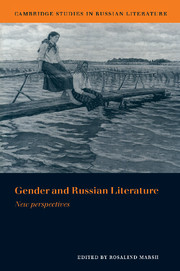Book contents
- Frontmatter
- Contents
- Notes on contributors
- Acknowledgements
- 1 Introduction: new perspectives on women and gender in Russian literature
- PART I HISTORICAL AND BIOGRAPHICAL PERSPECTIVES
- 2 Women in seventeenth-century Russian literature
- 3 Conflicts over gender and status in early nineteenth-century Russian literature: the case of Anna Bunina and her poem Padenie Faetona
- 4 Reading the future: women and fortune-telling in Russia (1770–1840)
- 5 Russian women writers of the nineteenth century
- 6 The ‘woman question’ of the 1860s, and the ambiguity of the ‘learned woman’
- 7 Carving out a career: women prose writers, 1885–1917, the biographical background
- 8 The fate of women writers in literature at the beginning of the twentieth century: ‘A. Mirè’, Anna Mar, Lidiia Zinov′eva-Annibal
- 9 Lidiia Zinov′eva-Annibal's The Singing Ass: a woman's view of men and Eros
- 10 Anastasiia Verbitskaia reconsidered
- 11 Soviet woman of the 1980s: self-portrait in poetry
- PART II THE PERSPECTIVE OF LITERARY CRITICISM
- Index
- CAMBRIDGE STUDIES IN RUSSIAN LITERATURE
3 - Conflicts over gender and status in early nineteenth-century Russian literature: the case of Anna Bunina and her poem Padenie Faetona
Published online by Cambridge University Press: 06 July 2010
- Frontmatter
- Contents
- Notes on contributors
- Acknowledgements
- 1 Introduction: new perspectives on women and gender in Russian literature
- PART I HISTORICAL AND BIOGRAPHICAL PERSPECTIVES
- 2 Women in seventeenth-century Russian literature
- 3 Conflicts over gender and status in early nineteenth-century Russian literature: the case of Anna Bunina and her poem Padenie Faetona
- 4 Reading the future: women and fortune-telling in Russia (1770–1840)
- 5 Russian women writers of the nineteenth century
- 6 The ‘woman question’ of the 1860s, and the ambiguity of the ‘learned woman’
- 7 Carving out a career: women prose writers, 1885–1917, the biographical background
- 8 The fate of women writers in literature at the beginning of the twentieth century: ‘A. Mirè’, Anna Mar, Lidiia Zinov′eva-Annibal
- 9 Lidiia Zinov′eva-Annibal's The Singing Ass: a woman's view of men and Eros
- 10 Anastasiia Verbitskaia reconsidered
- 11 Soviet woman of the 1980s: self-portrait in poetry
- PART II THE PERSPECTIVE OF LITERARY CRITICISM
- Index
- CAMBRIDGE STUDIES IN RUSSIAN LITERATURE
Summary
As Judith Vowles has recently observed, the history of the ‘feminization’ of Russian language and literature has been written almost entirely on the basis of what men wrote, and women's perception of their own relation to language and literature has received scant attention. The purpose of the present article is to illustrate the part of Vowles's argument dealing with women's resistance to the literary roles prescribed for them, by reference to Padenie Faetona (1811), the principal work of Anna Bunina, whom Vowles rightly identifies as one of the least conformist women writers of the period. Bunina frequently discusses gender issues and women's status in the literary process, but since space precludes extensive analysis of her accommodations and challenges to current ideas, I here focus on the poem which aroused most controversy amongst contemporary readers and aim to show how the views about women and writing discussed by Vowles manifested themselves in actual behaviour in one (of the few) documentable case(s).
Early nineteenth-century Russia was a particularly status-conscious society, in which the place of women was explicitly defined, and I shall describe the latter in some detail. At this point the events of the French revolution and the part played in it by politically active females had discredited women's emancipation in Russia. Social stability was a prime concern, and few disputed that women's place was in the family. The Sentimentalist definition of gender developed in the 1790s was based on Rousseau's view that women were naturally radically different from men, and that their function was as ornaments to men's existence, and instruments to men's well-being.
- Type
- Chapter
- Information
- Gender and Russian LiteratureNew Perspectives, pp. 55 - 74Publisher: Cambridge University PressPrint publication year: 1996
- 2
- Cited by



